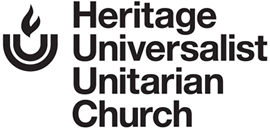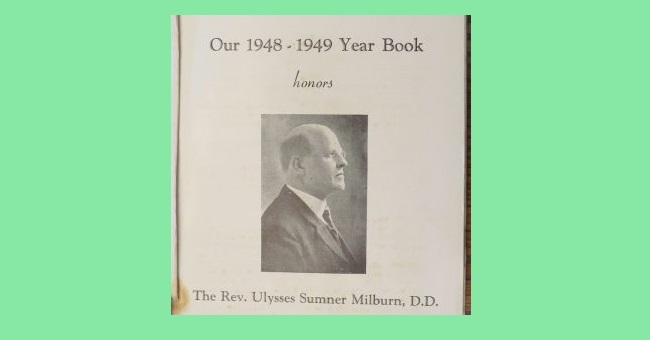by Mike Roberts, Church Historian
On January 9th, 1898, The Reverend Ulysses Milburn delivered a sermon to convince our congregation that building a new church in Walnut Hills was imperative to its continued existence. The group had left its Plum Street location nine years earlier and had been leasing space at the old Presbyterian Church in Peebles Corners during that ten-year interval. A vote was scheduled for the following Wednesday night for the congregation to decide whether or not to proceed with a building program. The excerpt from this sermon that follows was included in the annual bulletin for 1948-9 which marked the 50th anniversary of the Essex Street Church’s opening.
“Much is required of us as a church, because much is given us. We believe much. We believe the mission of Jesus Christ was successful; we believe in a triumphant God, in his universal Fatherhood. We believe more than the adherer of the partialistic theology; more is required of us. We have much; we must give and do much. We ought to give and do in proportion as our faith is beautiful.
Are we, individually, as zealous for our church as we might be—as we can be? Are we as loyal as we ought to be? Are we willing to give up some pleasure of society when church duty calls us? Are we willing to bestow time, strength, influence, our money, our presence, our prayers? Oh! My friends, if this church, which is so dear to you, the fabric of whose organization is entwined about your hearts; the very name—which means Universal Fatherhood, Universal Brotherhood; Universal Harmony, Universal Love—which is associated with the gayest, saddest, the most beautiful and most sacred memories of our lives, through the blessed associations of the past; if this church whose name is interwoven with the names of many of our fathers and mothers, for within this organization they lived and labored and entered into their rest; if this church were taken from us; if we would be denied its privileges; if we were prevented from worshiping in it, and coerced to acknowledge an opposing creed, we would rise in our might, resent with whole soul and body the outrage, and I verily believe we would be willing to shed our blood for it. BRETHREN, WE ARE NOT CALLED UPON TO DIE FOR OUR CHURCH. WE ARE CALLED UPON TO LIVE FOR IT! IN GOD’S NAME WILL WE HEED THE CALL?
Some of us feel that a crisis is at hand. We have reached a critical period in our church history. Upon our promptness to act depends the future success or failure of this church. We must not delude ourselves. Let us look this question fairly in the face. Our position is a critical one. We are not concerned about how we reached this critical condition: our business is to count our strength and look ahead. Our present condition, however, seems to be the inevitable outcome of many fortuitous circumstances, over which we had no control, conspiring against us. The shifting of the population of the city was the primal cause of our present condition. When all lived in what is the city proper, the church was accessible to all, and it was in a flourishing condition. The hill-tops were inviting, and one by one the families began moving to them, some miles from the church, with poor facilities for reaching it, rapid transit being unknown. Gradually, they lost interest in it; their children in some cases, entering other churches, rather than be in none. The church got in debt. The property was sold, and the congregation moved upon the hill, leaving many still in the city. This transplanting naturally stunted its growth for a while. It is only now recovering, time aiding it. We moved temporarily—until we could decide where to build—into this building, paying $35.00 a month rent. That was nine years ago—we are still here. The question now is: SHALL WE GET OUT AND LIVE, OR STAY IN AND DIE?
We have at present $15,000 with which to build a new church. Four or five thousand dollars can be raised to furnish it, and it could be dedicated free of debt. We get a perpetual lease, with the privilege of purchase at any time, at five percent, on a lot valued at $3,500 upon which to build. This interest is $245 a year less than we now pay for rent. The difficult problem is: Can the church be supported after it is built? The $15,000 is now yielding us an annual income of about five percent or $750. This will be cut off entirely. But deducting the $245 excess rent over ground lease and there is a difference of $505. This is the amount we annually must meet without subscriptions, over and above our present income. Can we do it? Or rather WILL we do it, FOR WE CAN!
If so, a new church-home can be built. Five hundred and five dollars a year more than we are doing gives us the new church. I believe we can raise that amount easier than we can raise our present subscriptions. We will have something to work for. Those who are liberal only in theology, but who do scarcely nothing for the church, will be liberal in more than name, for they will see that we mean to do something. New inspiration will be given, new hope engendered, new life acquired, new faith kindled, new love for church, and man and God produced. BRETHREN, THE OPPORTUNITY IS HERE. WILL WE USE IT OR LOSE IT? ‘Speak out in acts; the time for words has past, and deed alone remain.’ “
On the following Wednesday night, the membership voted to proceed with the building of the Essex Street Church.

